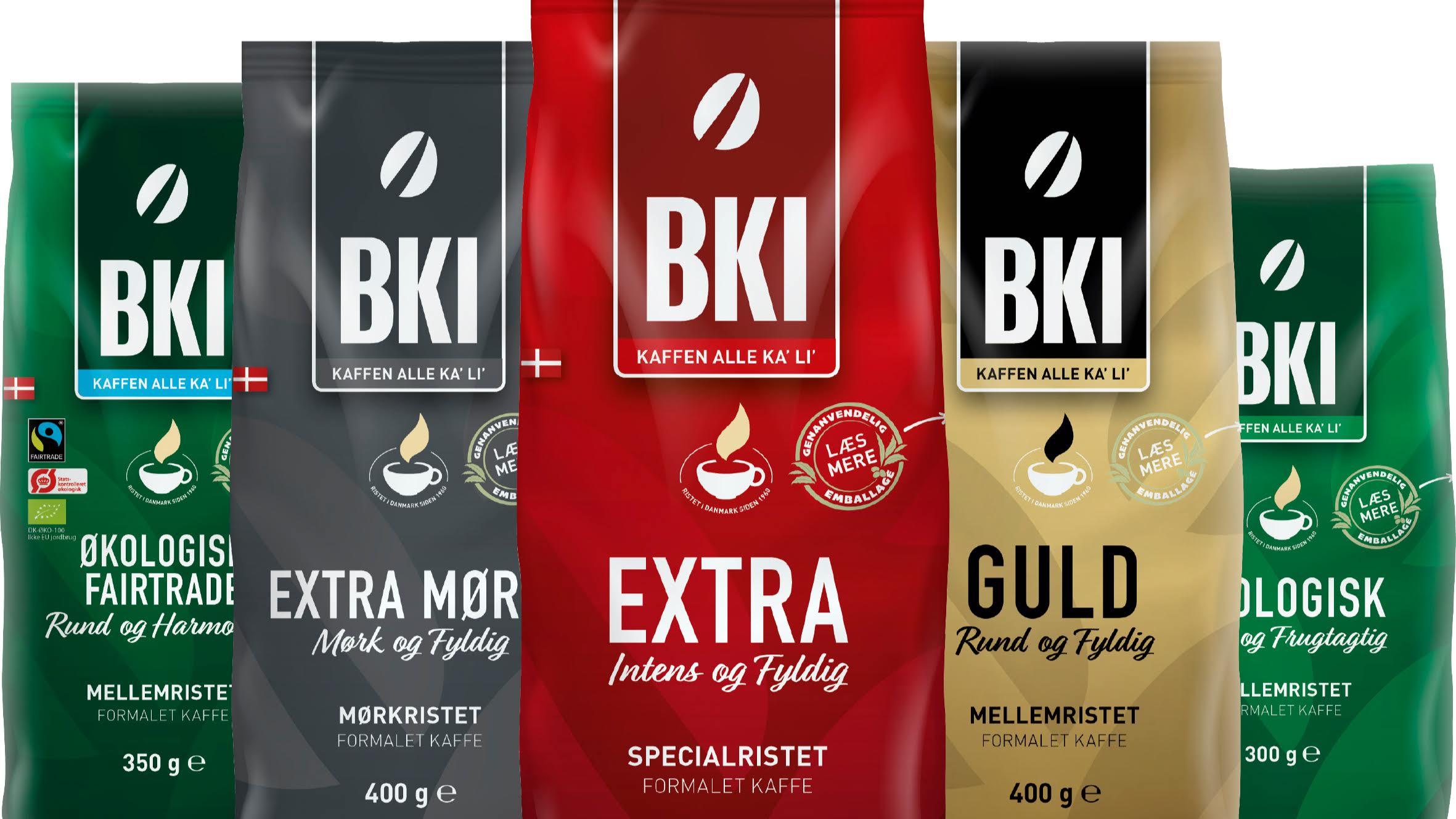BKI Foods in Højbjerg, Denmark has invented a new type of coffee bag in cooperation with Polyprint. The coffee bag is not only a breakthrough within sustainable food packaging, but Danish Technological Institute has also documented huge benefits related to the invention. An invention that The Danish Plastics Federation highlight as an innovative recycling solution, which can inspire many.

The coffee tastes as it should, and the coffee bag looks like itself.
The groundbreaking invention is not visible to the naked eye, but is close to 100 percent recyclable. The new coffee packaging at BKI Foods’ will have a noticeable impact for sustainable food packaging in general.
“Danish Technological Institute has – on behalf of BKI Food and Polyprint – analyzed and compared the carbon footprint created when manufacturing the current and the new coffee bags. We concluded that the shift in materials reduces the amount of plastics in production by 15 percent, when it comes to the weight. Furthermore, the carbon footprint is reduced by 23 percent thanks to the reduction in plastics in the manufacturing process,” says Peter Sommer-Larsen, Director for Plastics Technology at Danish Technological Institute.
The new packaging consists of a new type of thin, flexible foil that sets new standards for recycling of materials.
“We are Jutlanders. We have a calm approach, but have now tested different kinds of foil combinations the last one and a half years, and we are excited by the result. Our foil can be sorted out and recycled in a modern facility with over 99 percent recyclability. We hope that the new coffee bags can create big waves for us as a company,” says Carsten Brøgger, Purchase Manager at BKI Foods, who is a member of MADE.
The revolutionary part about the coffee bags is the foil inside the packaging that is developed in a partnership between BKI Foods and their foil supplier through 13 years, Polyprint.
An example everyone should followThe new multi-laminate bag introduced by the Danish coffee company also arouses enthusiasm in The Danish Plastics Federation. The last three years the Federation has been focusing on solving their biggest challenge – the sorting of household waste:
”99 percent recyclability is impressive. In 2025 new guidelines regarding product responsibility will take effect in Denmark. This means, that packaging on the market must be recyclable. The BKI Foods and Polyprint coffee bag is a great example, and one that everyone needs to learn from, when developing new sustainable solutions,” says Christina Busk, Environmental Manager at The Danish Plastics Federation. And she adds:
”In Denmark our percentage of recyclability has been all the way down to a few percent in terms of household waste, and in 2025 it is required by law to be at least 55 percent. So we really, really need to speed up the development.”
In the new design guide ”Reuse and recycling of plastic packaging for private consumers” the Danish Plastics Federation encourages other manufacturers to imitate BKI’s approach and take on responsibility for the green transition – without compromising the quality, or in this case the durability of the coffee. The choice of materials in BKI’s coffee bags are completely aligned with the recommendations in the design guide.
Invisible to the eye of the consumerIn order to demonstrate that the new coffee bags do not affect the durability and taste of the coffee BKI has sent the new bags to supermarkets without telling consumers about the ‘hidden’ change. The new packages have been in grocery shops near you for quite some time:
“We have produced approximately one million bags with the new foil combination since August 2019. So, they are already being used by consumers now – we just haven’t told them yet,” explains Carsten Brøgger.
A great taste with great savings to followSo, what are the benefits of the new coffee bags – both for BKI and for the surrounding society?
“We use less packing than before. And we have reduced the CO2 emission by 23 percent compared to current coffee bags according to reports made by Danish Technological Institute. The foil is now thinner which means, that we have can have 20 percent more on the pallet. As a result, we save every fifth pallet in our factory,” says Carsten Brøgger.
BKI saves storage room, uses less power, and the machines are working faster than before in the production. The journey towards the invention has been long and bumpy, and according to Carsten, there is an obvious reason why, BKI is a pioneer in this field:
“We are quick, because we are agile. BKI is a small company, and the decision-making process is short. I sit very close to production,” Carsten Brøgger explains. He is not the only one, that is excited about all the benefits that this invention creates.
“It is a lovely and right path, that we need to follow. We need to increase the recyclability. Laminates have often been an issue because of the various materials that make it more difficult to recycle. But now we have solved the problem, and in my view, it is a clear success story,” says Christina Busk, Environmental Manager at The Danish Plastics Federation.
Consumers will throughout February 2020 be introduced to the new invention when BKI shares their story about the new coffee bags in supermarkets. By then, the change will be apparent for everyone.
Benefits with the new coffee bag
- The foil reduces CO2 emissions by 23% compared to current coffee bags.
- The foil can be recycled.
- The foil does not contain aluminum and is therefore metal-free.
- Material consumption in manufacturing is reduced by 15 %
Source: BKI
Read more
- Read The Danish Plastics Federation’s new design guide
-
Read more about the background and development of the design guide (in Danish)